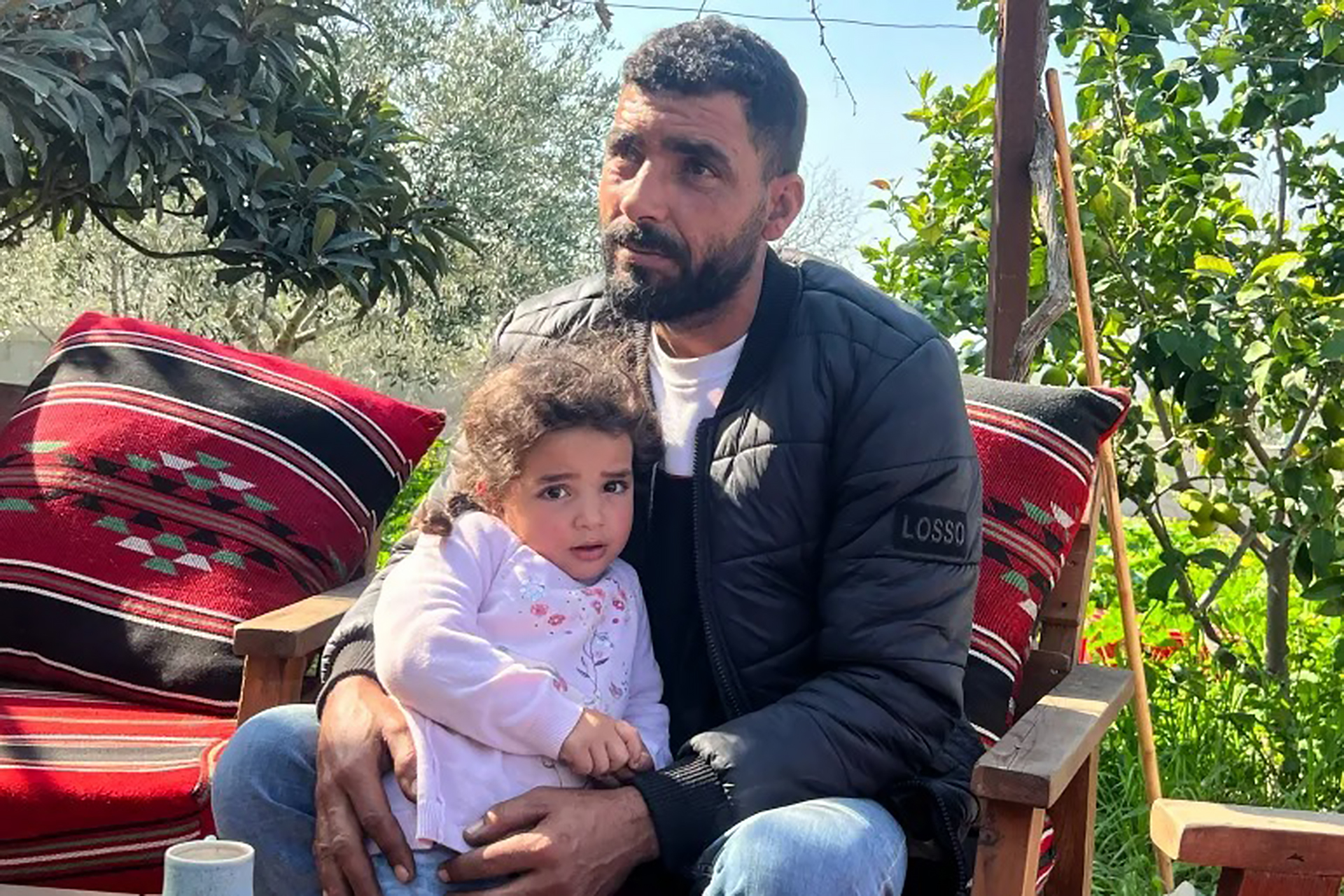Asim Khater, 36, wants nothing more than to build a fence around his yard to protect his three children from falling while playing in the nearby valley just 4 meters from the house, but if he does, he risks demolishing his entire two-story house by the Israeli army in the village of Burqin, west of the city of Salfit in the northern occupied West Bank.
For the past 17 years, the Israeli authorities occupying the West Bank have prevented the Palestinian Khater from making any changes or additions to the house he finished when he was 21 years old, on private land he inherited with documents bearing the name of his late grandfather's father.
Khater points to the illegal Israeli settlement of Brushin, 400 meters on the hill directly opposite them.
This is what we teach our children
Khater told Al Jazeera Net, which published a report on the increasing seizure of Palestinian homes and land by Israelis, "They come here and colonize. They are colonizers, not settlers, that's what we constantly teach our children."
When Khater moved into his home in 2007 with his bride Duaa, the Israeli army showed up on their doorstep with a "stop-work" order, a ban on making any changes to their home, arguing that his house was built without an IDF permit in Area C, which covers 60 percent of the West Bank under exclusive Israeli military control.
Close monitoring by authorities and settlers
He added that the Israeli authorities have been monitoring Khater's house and the surrounding area for 17 years with continuous patrols and surveillance drones, confiscating any construction tools and demolishing any new facilities.
The report says that not only were Israeli authorities monitoring him, but Israeli settlers from nearby illegal settlements were empowered to monitor him.
The Israeli government gives settlers in the West Bank about $5.5 million annually to monitor, report, and restrict Palestinian construction in Area C. The money is used to hire inspectors and buy drones, aerial photographs, tablets and vehicles, among other things.
The illegal Israeli settlement of Brushin as seen from Khater's house in the Palestinian village of Burqin (Al Jazeera)
Doubling the monitoring budget
The report stated that on April 11, the Israeli authorities requested that this amount in the state budget be doubled to $1.<> million.
"You can't add anything to your house at all, even the tools belonging to the Palestinian government are confiscated," Khater said.
In June 2022, 17 years after their move, the couple was surprised to find the Israeli army returning a demolition order and a three-day grace period during which they could petition the Israeli Supreme Court.
While Khater has filed the petition and is awaiting a response, the Israeli army could demolish his home at any moment.
Constant fear
"Home is supposed to be the safest place for humans, but we are constantly afraid to wake up and find them here, we sleep at three in the morning every day and wake up before six in the morning, because we expect them to come late at night or in the early hours of the morning. That's how we live."
The Khater family is one of tens of thousands in Area C of the West Bank who live in constant fear of being forced to leave their homes and land by Israel.
The report documented that Israeli forces already forcibly displaced 218 Palestinians from their homes in Area C demolitions in the first three months of 2023, representing more than a third of the 594 Palestinians displaced there in the whole of 2022, according to UN figures.
Forced displacement
He said the new far-right Israeli government had driven its previous plans for the forced displacement of thousands of Palestinians in the Massafer Yatta and Khan al-Ahmar areas in Area C, as well as increased demolitions of Palestinian homes in occupied East Jerusalem.
Approximately 12 percent of the Palestinian population currently lives in the West Bank in Area C, or about 375,46 people. While at least 1 percent of this area consists of private Palestinian land, less than <> percent is accessible to Palestinians, and most of it is already built on it.
Area C is largely rural and contains the only remaining land for Palestinian expansion and development. It is also the only part adjacent to the West Bank.
Khater inherited the land on which he built his house from his father (Al-Jazeera)
Converting the bank into 165 enclaves
The presence of illegal Israeli settlements, the separation wall, and hundreds of checkpoints and military bases have turned the West Bank into 165 disconnected Palestinian enclaves suffering from severe settlement pressure and severe restrictions on movement.
Meanwhile, the report says, more than 70 percent of Area C, about 44 percent of the West Bank, is used for illegal Israeli settlements and firing zones, among other no-go zones.
The Israeli government has sought to formally annex the area after constructing hundreds of illegal settlements and outposts since 1967, most of which were built either in whole or in part on private Palestinian land, and is now home to some 700,<> Israeli settlers.
The settlements violate international law and serve to prevent the establishment of any potential Palestinian state on the territories occupied in 1967 in the West Bank, East Jerusalem and the Gaza Strip.
Forcing them to retreat
The report goes on to say that the new Israeli government has significantly intensified enforcement of demolition orders in Area C, causing panic among residents, and the Israeli military is not the only party harassing Palestinians in this area.
For the past few years, the Israeli military has operated a hotline called "War Room C" for settlers to call and report on Palestinian construction in the area.
Israel wants to force the Palestinians to retreat to the smallest possible amount of land and drive them out of their country. That's it."

